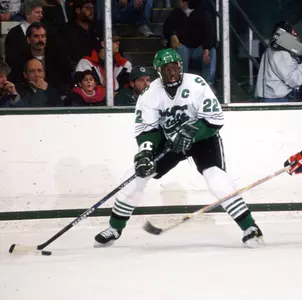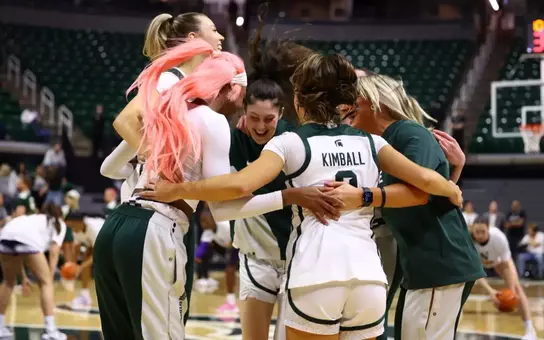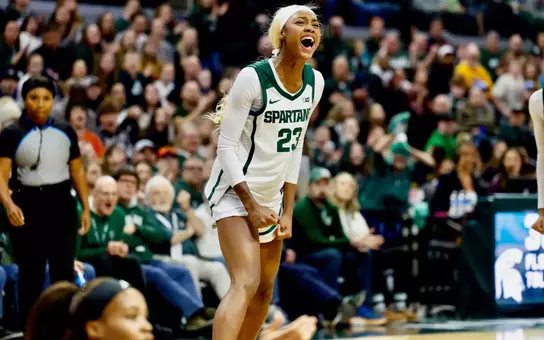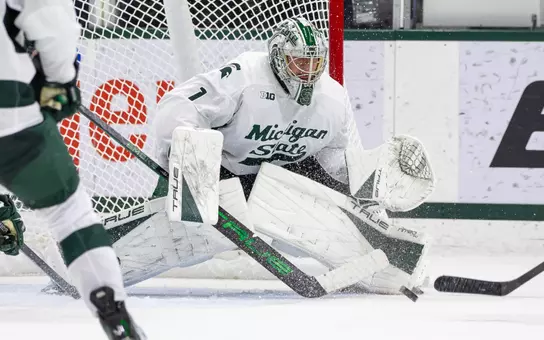Michigan State University Athletics

Anson Carter: Hockey Hero & Budding Filmmaker
3/1/2007 12:00:00 AM | General
Feb. 28, 2007
February is Black History Month, and nowhere in major-college athletics is that history richer than at Michigan State University. From Gideon Smith, the first African-American football player at Michigan Agricultural College in 1913, to Steve Smith, an All-American basketball player whose contributions have a major impact today, it would take many months to tell the full story. In a series of profiles, longtime Michigan State beat writer and columnist Jack Ebling will highlight some of the greatest of the great. The ninth of those stories is hockey hero and budding filmmaker Anson Carter.
ANSON CARTER
He can still see the look on his parents' faces when his first hockey gear cost them $300. Their 8-year-old couldn't even skate.
Anson Carter's mom and dad haven't let them forget that fact. But after a brilliant career at Michigan State and a decade in the NHL, he can always say it was the best investment they've made.
Where his parents grew up in Barbados, no one played hockey. Where Carter was raised in the Toronto suburbs, nearly everyone did. Most of them started before their first day of school. Carter waited, then schooled his opponents.
"I was always a pretty good street hockey player," Carter said. "We used a tennis ball and wore boots. But when my sister, Michelle, got to play soccer, my parents wanted to treat us equally. Of course, she has always said my sport was way more expensive than hers."
Carter paid the price with a series of fat lips. He spent his first six months on skates in Scarborough trying to get out of people's way. But a major breakthrough was just ahead.
"When I finally got a new pair of skates with ankle support, I felt like Wayne Gretzky," Carter said. "I was scoring four or five goals a game. So I asked my parents if they'd let me play on a travel team. That led to a lot of opportunities."
By the time he was starring for the Tier II Wexford Raiders in the Ontario Hockey Association's Junior "A" League, Carter was paid a visit by ex-Red Wings goalie Jim Rutherford, who was drafting for Detroit Compuware.
"He came to my house and had to wonder," Carter said of his new general manager after a trade last week from Columbus to Carolina, the defending Stanley Cup champ. "Where was I? Playing street hockey again with my friends. I had to get cleaned up in a hurry."
Carter's coach with Wexford, Stan Butler, had tremendous contacts in the U.S. and helped roughly 10 players a year earn college scholarships, including Kelly Harper, Steve Norton and Steve Guolla with the Spartans.
"The first trip I took was to State for a game against Western Michigan," Carter said. "When we heard about college hockey, we thought about U-T (the University of Toronto) or York. So to see 6,500 fans wearing green, going nuts, was amazing. I stayed with Guolla and was sold right away. But I didn't tell them that."
He had a tougher time telling other coaches what he wanted to do. But Carter's experience could come in handy if he fulfills a little-known dream of some day becoming the head coach at MSU.
"When I got home, the first thing I did was tell my parents what I wanted to do," Carter said. "Then, I told Red Berenson at Michigan. He wasn't very happy. Neither was Newell Brown at Michigan Tech. And Jeff Jackson at Lake Superior State wouldn't talk to me for a while."
All he did with the Spartans was lead the team in goal scoring three times, including a 34-goal junior season in 1994-95, when he was named second-team All-American. He also won the Outstanding Rookie, Outstanding Senior and Amo Bessone Awards - the latter for athletic, scholastic and community participation.
"It was the best four years of my life," Carter said. "I tell that to teammates all the time. I say, `If you'd ever spent any time at Michigan State University, you'd think that, too.' I still have two labs to finish to get my degree. But I can't think of a better job than being a college hockey coach. And there CAN'T be a better job than coaching at Michigan State. Would I want to do that when I'm done in the NHL? Definitely!"
Carter had a pretty good role model in the winningest coach in NCAA history, Ron Mason. Though Mason might not have known it at the time, he was being studied intently.
"I was in awe of the man," Carter said. "He was always talking to guys like Scotty Bowman and implementing things. And he'd tell some great stories. He always made you better. So did having guys like Roddy Brind'Amour come back and work out. I was only 140 pounds when I was 18. So I had to develop my man-strength and spend a lot of hours in the gym."
Goal scoring came naturally to Carter and still does, as seen by the 33 he posted last season for Vancouver, his sixth of eight NHL stops. But there was one thing that bugs him to this day about his winters in comparatively balmy East Lansing.
"We didn't win an NCAA title, and I got tired of looking of those pictures on the wall," Carter said. "Otherwise, it was great. I was a 10th-round pick, not a can't-miss guy. So I spent time with my major, sociology. And I lived in Wonders Hall for a year."
The first day "Ace" walked into the Wonders cafeteria, he noticed a strange separation with blacks clustered together and whites everywhere else. Like his hockey gear after double-sessions, that had to change.
"I said, `Hmmm, this is kind of interesting,' and sat down with the other players," Carter said. "Everyone else was white, and they looked at me as if to say, `What are you doing?' The black guys looked at me funny, too. When I talked to them and explained I was a hockey player from Toronto, they asked, `Do you live in an igloo?' and `Do you skate to school?'"
When asked, "How does it feel to be a black hockey player?" Carter answered, "I don't know how it feels to be a white hockey player." But he answered more ignorant statements the best way he could - by lighting the lamp behind the net.
"Michigan had this kid who'd been drafted by the Islanders, and he said, `Shut up, n-----!'" Carter recalled. "He was supposed to be an educated individual. But I'd had bananas thrown at me, been told to go back to Africa and all that stuff. I knew racism existed. And I refused to let one person's actions affect how I saw the world."
Carter said if he hadn't come to MSU, he'd probably be pumping gas somewhere. Instead, he has pumped his fist after 201 NHL goals. He has run the hip-hop recording label for his company, Big Up Entertainment. And he has produced two films - "Bald" and "Knock Knock" - and written the latter.
"The music business has fallen off, but making movies is a lot more fun," Carter said. "It's like being a general manager. I'm a big fan of the horror genre. But I'm not done in the NHL yet. I always say I was a late bloomer, so I should have another five years in me. Then, who knows? I don't know Rick Comley that well, but I always follow his team in the box scores. And some day . . . ."




